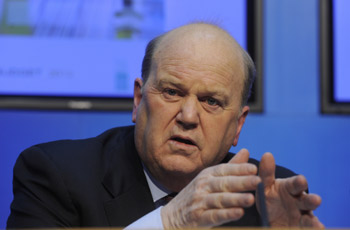Budget strings now pulled in Europe

The Irish economic fortunes are well and truly decided by Europe and the Irish government is simply reading from a script, writes Dan White
16 December 2011
In truth Messrs Howlin and Noonan now occupy a position
little different from that of Northern Ireland Finance Minister Sammy Wilson. While they may enjoy the trappings of office, real power rests elsewhere. First Brendan Howlin on 5 December and then Michael Noonan the following day, while going through the motions of delivering an Irish budget, were in reality sticking tightly to a script that had been written elsewhere.
Defining summit
The implications of the Irish budget had barely been digested when two days later on 8 December, European leaders met for what may prove to be the defining EU summit of this generation. David Cameron’s use of the veto seems to have irrevocably damaged Britain’s standing in Europe. This is very bad news for this country, which in practice operates an informal alliance with the UK on most matters European.
With Britain now in the EU doghouse what is that alliance worth now? Probably not a lot. Who can we turn to among the EU’s big boys to look out for our interests? The reality is that, for the first time since we joined what is now the EU in 1973, we are now truly on our own. With the state effectively in receivership and utterly dependent on regular infusions of cash from the Troika to pay its bills, that is a truly frightening prospect.
Erosion of sovereignty
While the disastrous 8-9 December summit seems to have “saved” the euro for now, it marked a further significant erosion of Irish economic sovereignty. The “fiscal compact” agreed by 26 of the 27 eurozone member countries will subject national budgets, not least our own, to an unprecedented degree of EU monitoring and supervision.
This means that whenever we do finally emerge from the EU/IMF bailout we still won’t be masters in our house. Far from it. In practice future Irish Finance Ministers will be fiscal puppets whose strings are pulled from Brussels and Frankfurt.
Of course, given the Irish state’s embarrassing inability to manage its own financial affairs, and that the current crisis is the second time in most people’s lives that runaway public spending has brought the country to its knees, there are many people who might argue that a little adult supervision would be no bad thing.
Be careful what you ask for. Taoiseach Enda Kenny spent most of his first four months in office fending off efforts by France and Germany to scrap our 12.5% company tax rate. It finally seemed as if he had succeeded at last July’s EU summit when he declared the dispute “over”.
Common corporate tax rate
Except that of course it wasn’t. As part of the fiscal compact agreed at the December summit, France and Germany are pushing hard for the creation of a common corporate tax base. In essence this would see company profits taxed in the country where sales take place, for example France or Germany, rather than in the country where the goods and services are actually produced, such as Ireland.
While the creation of a common corporate tax base would not result in the formal abolition of the 12.5% tax rate it would amount to pretty much the same thing in practice.
With Britain now out in the cold, the one EU big boy who was broadly sympathetic to our case is unable to offer us any assistance even if it wanted to. Indeed such is the hostility to Britain from the rest of the EU following the 8-9 December summit that its support would probably do our cause more harm than good.
The implications of the loss or serious curtailment of the 12.5% tax rate are extraordinarily serious for the already battered Irish economy. It isn’t just the 140,000 people who work for Irish-based multinationals and the further 100,000 jobs which they support elsewhere in the economy, or even the more than €1.2bn in taxes these companies pay to the exchequer every year that are so important.
Even more vital is the estimated E19 billion that the multinationals spend each year on Irish wages, goods and services. That’s the equivalent of more than 15% of our GNP. If we were to lose that then Ireland would be reduced to the status of a Portugal without the sunshine.
More radical cuts to come
Even if we can somehow manage to hang on to the 12.5% tax rate it is clear that the fudges which characterised the December budget, ie, no cuts in public sector pay despite public sector hourly rates being 48% higher than those in the private sector and no cuts in headline social welfare payments although Irish social welfare rates are more than twice those paid in Germany, will be the last of their kind.
With most of the easy savings having been already achieved, the Troika will use the battering ram provided by the fiscal compact to force through much more radical spending cuts in the 2013 budget. Was it any coincidence that Communications Minister Pat Rabbitte was speaking of the need to “renegotiate” the Croke Park agreement, under which public sector workers have been guaranteed no further pay cuts or compulsory redundancies before 2014, just two days after the latest EU summit had concluded?
When a wily old fox like Pat Rabbitte, a former Labour Party leader and trade union official, starts saying the unsayable, you can take it that the situation has changed dramatically.
So when Messrs Howlin and Noonan repeat their double act in 12 months time, assuming of course that the coalition government survives and the euro remains intact, they will be delivering a far harsher script on behalf of our European “partners”.



 Print
Print






Fans 0
Followers